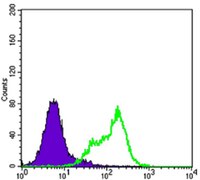MABD172 Sigma-AldrichAnti-THAP11 Antibody, clone 3F3
Anti-THAP11 Antibody, clone 3F3 is a highly specific mouse monoclonal antibody, that targets Thanatos-associated protein 11 & has been tested in western blotting, Immunofluorescence, IHC & Flow Cytometry.
More>> Anti-THAP11 Antibody, clone 3F3 is a highly specific mouse monoclonal antibody, that targets Thanatos-associated protein 11 & has been tested in western blotting, Immunofluorescence, IHC & Flow Cytometry. Less<<Produits recommandés
Aperçu
| Replacement Information |
|---|
Tableau de caractéristiques principal
| Species Reactivity | Key Applications | Host | Format | Antibody Type |
|---|---|---|---|---|
| H | WB, IF, IHC, FC | M | Ascites | Monoclonal Antibody |
| References |
|---|
| Product Information | |
|---|---|
| Format | Ascites |
| Control |
|
| Presentation | Mouse monoclonal IgG1 ascitic fluid containing up to 0.1% sodium azide. |
| Quality Level | MQ100 |
| Physicochemical Information |
|---|
| Dimensions |
|---|
| Materials Information |
|---|
| Toxicological Information |
|---|
| Safety Information according to GHS |
|---|
| Safety Information |
|---|
| Packaging Information | |
|---|---|
| Material Size | 100 µL |
| Transport Information |
|---|
| Supplemental Information |
|---|
| Specifications |
|---|
| Global Trade Item Number | |
|---|---|
| Référence | GTIN |
| MABD172 | 04053252918117 |
Documentation
Anti-THAP11 Antibody, clone 3F3 FDS
| Titre |
|---|
Anti-THAP11 Antibody, clone 3F3 Certificats d'analyse
| Titre | Numéro de lot |
|---|---|
| Anti-THAP11, clone 3F3 - QVP1305208 | QVP1305208 |
| Anti-THAP11, clone 3F3 - VP2201040 | VP2201040 |










